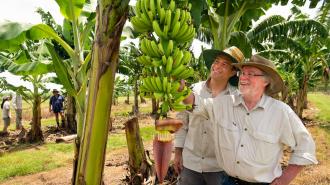Australia has just approved a banana that has been genetically modified to resist the fungal infection known as Panama Disease — a devastating threat to banana crops around the world.
It is the first GM banana ever approved, but varieties designed to resist other crop diseases are already in the works.
Money in the banana stand: Bananas are big business. As of 2023, the industry was valued at $25 billion, and many people around the world depend on the fruit for income or nutrition.
At any moment, though, a country’s banana industry can be crippled by an invasion of Panama Disease TR4 — an incurable, practically ineradicable infection.
“[The fungus] stays in the ground for more than 50 years, wiping out banana crops and destroying farms for generations.”
James Dale
TR4 has been spreading globally for decades and attacks nearly all banana varieties, including the Cavendish banana, the world’s most popular variety since a previous epidemic of Panama Disease wiped out the Gros Michel banana in the 1950s.
“The devastating Panama Disease TR4 is caused by a soil-borne fungus that stays in the ground for more than 50 years, wiping out banana crops and destroying farms for generations,” said James Dale, director of the Centre for Tropical Crops and Biocommodities at Australia’s Queensland University of Technology (QUT). “It is a huge problem.”
Two decades to save the banana: Dale and his colleagues have spent more than 20 years developing the QCAV-4 banana, a genetically modified (GM) variety of the Cavendish banana that is highly resistant to Panama Disease TR4.
All that hard work has now paid off, as Australian regulators recently ruled that the GM banana is as safe and nutritious as unmodified bananas. If the nation’s food ministers don’t question the ruling by mid-April, the banana will be approved for sale in Australia.
“This is a wonderful example of fundamental research progressing through a commercialisation journey into a tangible outcome … it’s fantastic to reach this milestone,” said Margaret Sheil, QUT’s Vice-Chancellor Professor.
How it works: QCAV-4 isn’t the first gene-edited banana to be approved for human consumption — in 2023, the Philippines greenlit a variety of banana that was edited to not turn brown so quickly.
That was done by simply silencing a gene the banana already had, though. The QUT team created its GM banana by splicing in a gene called “RGA2” that comes from a wild banana variety. This gene makes those bananas nearly immune to Panama Disease, and while Cavendish bananas have the same gene, their version is dormant.
“There’s nothing scary,” Dale told ABC News. “The gene was already present in Cavendish … It just doesn’t work, so we have put in a version that works.”
“This is really our safety net.”
James Dale
Looking ahead: If the GM banana is approved for sale in Australia, that doesn’t mean anyone is going to start growing and selling it — the QUT team views QCAV-4 as a back-up plan, something that could be produced if Panama Disease started spreading across Aussie banana farms.
“[T]his is really our safety net,” said Dale. “Cavendish bananas are not going to disappear [but] this banana is ready to go, though, if TR4 really gets going and starts to really hurt our industry.”
We’d love to hear from you! If you have a comment about this article or if you have a tip for a future Freethink story, please email us at [email protected].






